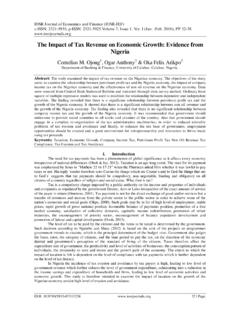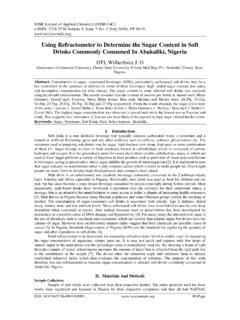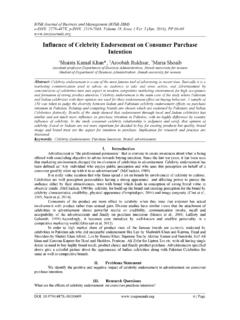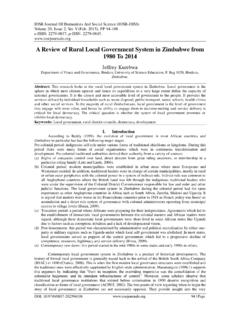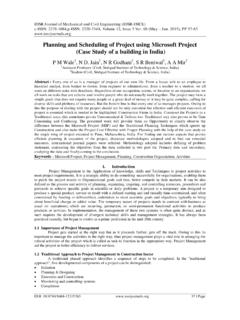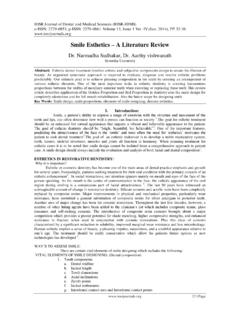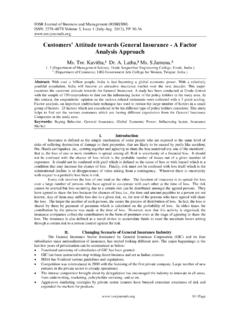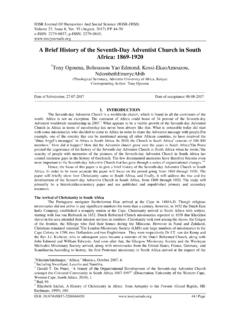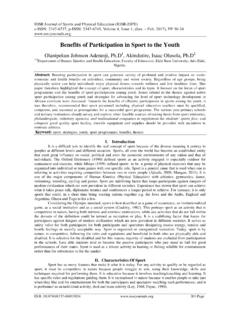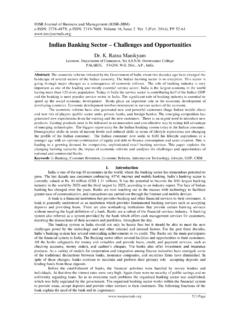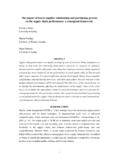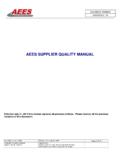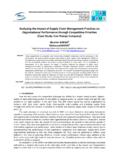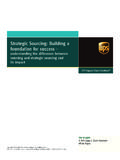Transcription of Effects of Supplier Relationship Management on the ...
1 IOSR Journal of Economics and Finance (IOSR-JEF) e-ISSN: 2321-5933, p-ISSN: 6, Issue 3. Ver. III ( 2015), PP 28-35 DOI: 28 | Page Effects of Supplier Relationship Management on the Performance of Organizations in Selected Sugar Companies in Western Kenya Kasisi Maraka1, Kibet2, Dr. Iravo Mike3. Msc student-Jomo Kenyatta University of Agriculture and Technology Lecturer at Moi University Lecturer at Jomo Kenyatta University of Agriculture and Technology Abstract: This study was aimed at filling these gaps on how Supplier relations Management could be used to enhance the performance of the sugar industry in Kenya. The study was guided by the following research objectives, to: determine the effect of the organization structure in the performance of an organization, determine the effect of value measurement on the performance of an organization, determine the effect of collaboration on the performance of organizations and finally determine the Effects of technology in the performance of an organizations.
2 The study adopted a survey and targeted the Management and the procurement staff of the three selected sugar companies in western Kenya which are Mumias, West Kenya and Butali Sugar Companies. The study targeted the 25 departmental staff in the three companies and inclusive of the three procurement managers who head the respective procurement departments in the companies. A total of 25 respondents were therefore targeted. The research employed a census study design. The sample size of the study comprised of 25 respondents. The questionnaires were issued to the procurement staff through their respective managers. I. Introduction Background of the Study Organizational performance refers to how well an organization achieves its market-oriented goals as well as its financial goals (Stanley, 2001).
3 The short-term objectives of SRM are primarily to increase productivity and reduce inventory and cycle time, while long-term objectives are to increase market share and profits for all members of the supply chain. Any organizational initiative, including supply relations Management , should ultimately lead to enhanced organizational performance (KiIpatrick, 2000). A number of prior studies have measured organizational performance using both financial and market criteria, including return on investment (ROI), market share, profit margin on sales, the growth of ROI, the growth of sales, the growth of market share, and overall competitive position (Harps, 2000). In an increasing competitive marketplace, firms are seeking new methods of enhancing competitive advantage (Ihiga, 2004).
4 Today, purchasing is becoming a strategic function and a key factor in competitive positioning. With consolidation of firms within industries, Supplier relationships are becoming more critical in the future. Firms have realized that collaborative business relationships improve a firm's ability to respond to the new business environment by allowing them to focus on their core businesses and reduce costs in business processes (Johnson, 2009). Supplier Relationship Management (SRM) plays an important role in the reduction of costs and the optimization of performance in industrial enterprises (Caeldries, 2008). Supplier Relationship Management is a comprehensive approach to managing an organization s interactions with the firms that supply the products and services it uses.
5 SRM is understood as the sourcing policy-based design of strategic and operational procurement processes as well as the configuration of the Supplier Management (Kleinbaum, 2008). Problem Statement Contractual relationships have been hypothesized to have a significant effect on the performance of organizations but many firms that have engaged in contractual relationships with their suppliers have been found to still suffer from losses either owing to litigation costs or from failure of suppliers to meet conditions stipulated. Firms engaged in vertical integration on the other hand despite benefiting from reduced lead times in the supply chain have been found not self sustaining owing to the concentration of the company s efforts in a number of areas that are not core areas of operations.
6 The value of this Relationship therefore has been questioned with gains from this Relationship hardly being quantifiable Consequently some firms have preferred partnerships where the buyers and the suppliers collaborate through good will but the benefits of these relationships have hardly been studied and consequently its benefits Effects Of Supplier Relationship Management On The Performance Of Organizations DOI: 29 | Page have not been ascertained. It is therefore against this background that the study aims to assess the Effects of the Supplier Relationship Management on the performance of private sugar companies in western Kenya. Research objectives Overall Objectives To establish the Effects of Supplier Relationship Management on the Performance of Organizations in Selected Sugar Companies in Western Kenya.
7 Specific objectives The study was guided by the following specific objectives i. To determine the effect of organizational structure on the performance of private Sugar Companies in western Kenya ii. To determine the effect of value measurement on the performance of private Sugar Companies in western Kenya iii. To determine the effect of collaboration on the performance of private Sugar Companies in western Kenya iv. To determine the effect of technology on the performance of private Sugar Companies in western Kenya Research questions The study was also guided by the following research questions i. Does the organizational structure affect the performance of private sugar companies in Western Kenya? ii. Does value measurement affect the performance of private Sugar Companies in Western Kenya?
8 Iii. Does collaboration affect the performance of private Sugar Companies in western Kenya? iv. Does technology affect the performance of private Sugar Companies in Western Kenya? II. Introduction Previous studies in SRM have considered the measurement of competencies, strategy, capabilities and the effect of each on performance. Day (2004) used core capabilities as independent variable and performance as the dependent variable, using a baseline survey methodology. Stanley and Gregory (2001) used strategy implementation as the independent variable and performance as the dependent variable applying a triangulation methodology consisting of literature review, survey and case studies. Organizational Structure While there is no one correct model for deploying SRM at an organizational level, there are sets of structural elements that are relevant in most contexts: A formal SRM team or office at the corporate level; the purpose of such a group is to facilitate and coordinate SRM activities across functions and business units.
9 SRM is inherently cross-functional, and requires a good combination of commercial, technical and interpersonal skills. A formal Relationship Manager or Supplier Account Manager role; such individuals often sit within the business unit that interacts most frequently with that Supplier , or may be filled by a category manager in the procurement function. These roles can be full-time, dedicated positions, although Relationship Management responsibilities may be part of broader roles depending on the complexity and importance of the Supplier Relationship . SRM managers understand their suppliers business and strategic goals, and are able to see issues from the Supplier s point of view while balancing their own organization s requirements and priorities. An executive sponsor; and for complex, strategic Supplier relationships, then a cross-functional steering committee will do.
10 These individuals form a clear link between SRM strategies and overall business strategies, serve to determine the relative prioritization among a company s varying goals as they impact suppliers, and act as a dispute resolution body. The SRM office and supply chain function are typically responsible for defining the SRM governance model, which includes a clear and jointly agreed governance framework in place for some top-tier strategic suppliers. Effective governance should comprise of a face-off model connecting personnel in different departments such as procurement, logistics, engineering quality and operations with their Supplier counterparts, regular operational and strategic planning and review meetings and well-defined escalation procedures to ensure speedy resolution of conflicts at the appropriate organizational levels.
